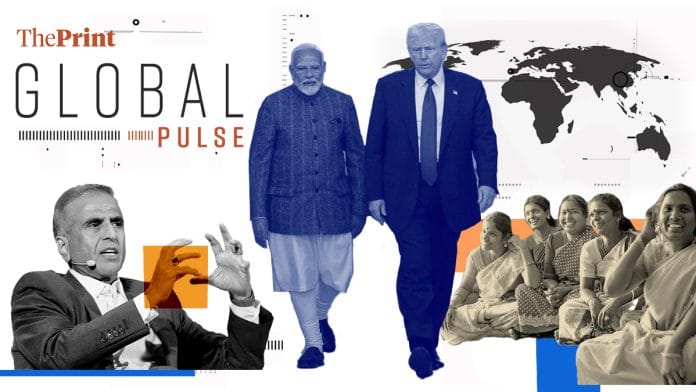New Delhi: US President Donald Trump’s tit-for-tat tariff wars might have India at another economic crossroads—much like the economic reforms of 1991, according to the BBC.
“Could this be a major opportunity for the world’s fifth largest economy to shed its protectionism and further open up its economy? Will India seize the moment, just as it did more than three decades ago, or will it retreat further?” the BBC asks.
In a long report on the potential impact of trade wars, the BBC states that the jury is still out on whether it’ll help India “break free or double down” on protectionism.
India is expected to lose up to $7 billion annually from reciprocal tariffs, it says, primarily in sectors like metals, chemicals and jewellery, with pharmaceuticals, automobiles and food products also at risk.
The report observes that the Modi government seems to have shifted gears, willing to change: commerce minister Piyush Goyal has made two trips to the US recently to discuss a potential trade deal following Trump’s threat of retaliatory tariffs. India is also actively pursuing free trade deals with the European Union, the UK and New Zealand.
“Many economists believe that protectionist policies over the past decade have undermined Modi’s Make in India initiative, which prioritised capital- and technology-intensive sectors over labour-intensive ones like textiles. As a result, it has struggled to boost manufacturing and exports,” the BBC writes. “With India’s tariffs already higher than those of most countries, further increases could be especially damaging.”
This is why India “finds itself at a crossroads”, the BBC notes, quoting a trade expert who says that India can lower protectionist barriers in South Asia and strengthen ties with Southeast Asia and the Middle East and thereby “lead in shaping a new trade vision, positioning itself as a key player in a ‘re-globalised’ world”.
But reducing tariffs could also lead to dumping, where foreign companies flood the market with cheap goods—China, too, could dump in India given its own trade struggles with the US.
“There’s also a growing concern that India may be overcompensating in its efforts to flatter the US,” the BBC continues. If India continues softening its policies—showing a “lack of assertiveness in global trade talks”—then “India may end up making even more compromises in its trade deal with the US, further “eroding its bargaining power”.
At the private level, however, Indian companies seem to be increasing their bargaining power.
Financial Times reports that billionaire Sunil Bharti Mittal is considering increasing his holding in the BT Group, one of UK’s leading multinational telecommunications holding companies, to a 24.5 percent stake.
“Mittal, who in Bharti Airtel created one of the world’s biggest network providers and owns stakes in a number of other telecoms and technology groups around the world, has signalled clearly to BT that he sees himself as a long-term investor,” FT reports.
“The billionaire is in the process of converting his 24.5 percent stake, which was partly taken via derivatives contracts, into equity, said people familiar with the situation. Mittal took an initial 10 percent holding last year, which is being increased to 24.5 percent after securing national security approvals in December.”
The report adds that Mittal has taken a “hands-on approach” to his investments so far, referencing his “feeling of a shared history with the UK telecoms operator, which was a minority shareholder in Bharti Airtel in the late 1990s”. He’s reportedly “open” about his desire to be closely involved with the company.
BT shares rose 1.5 percent the day the report was published.
The New York Times, meanwhile, reports on the struggle for representation of women in politics in rural India, in a story headlined ‘Six Women Were Elected. So Why Were Their Husbands Sworn In?’
Referencing a video that went viral from Paraswara in Chhattisgarh, NYT reports that the “scandal was that six of those elected to lead the village had been women. Those six were absent, each one represented by her husband instead”.
“The public erasure of the six female officeholders was shocking but hardly surprising,” the report explains. “This kind of unofficial substitution is commonplace in rural India, in exactly the places where small-time leadership positions have long been set aside for women.”
Since 1992, the national rules concerning panchayats promised at least one-third representation for women, in an attempt to empower a generation of women leaders. Over time, this has evolved into a practice in which women elected to panchayats end up “serving as deputies to their own husbands, who wield power alongside the elected men”—a role called “pradhan pati” or “boss husband.”
“India has a long way to go to empower women at the national level, too,” NYT observes, noting that only 15 percent of parliamentarians are women, and that there are only two women in Prime Minister Narendra Modi’s 30-member cabinet.
“The government approved a constitutional amendment in 2023 to reserve a third of all parliamentary seats for women, though it will not go into effect for at least another four years,” the report says. “While many female politicians have risen to national prominence, that has come not via panchayat seats, but often through association with established male politicians.”
(Edited by Nida Fatima Siddiqui)
Also Read: Modi’s comments on podcast draw reactions from neighbours—praise from China, flak from Pakistan






